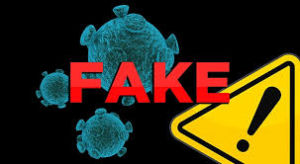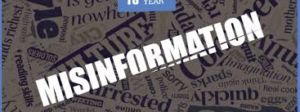On April 1, 2020, in the Daily Maverick on CORONAVIRUS FACT CHECK#1, Rebecca Davis writes:
With a third of the world’s population locked down in their homes, and with wide access to smartphones, in an atmosphere where people are desperate for information, fake news is everywhere. In South Africa, smartphones are abuzz with WhatsApp-ed claims about the coronavirus. They should be greeted with great scepticism.
Almost everyone will have by now received some information about the coronavirus which is wholly false or only partially true. Mostly, the misinformation is being spread on WhatsApp – often by older family members or less tech-savvy acquaintances.
“We have a scenario that is a perfect storm for mis- and disinformation,” Media Monitoring Africa director William Bird told Daily Maverick.
“You have fear, low levels of general knowledge of the virus itself, of public health in general, of an invisible enemy and millions of variables.”
Bird says that Media Monitoring Africa has already seen a “massive increase” of dodgy news circulating locally during this period.
Thus far, there has been no suggestion that political forces are seeking to exploit the confusion around coronavirus in South Africa to sinister ends – unlike in Europe, where an EU monitoring team claimed that Russian media outlets were spreading disinformation about the pandemic with the aim of “aggravating the public health crisis in Western countries”.
But that doesn’t mean that fake news spread by ordinary citizens can’t hinder attempts to tackle the virus here as well as elsewhere. In recognition of this, the South African government now considers the spread of fake news about coronavirus an offence punishable by a fine, six months’ imprisonment, or both.
Authorities have already cracked down harshly on those seeking to spread online messages minimising the virus’s harm. Police Minister Bheki Cele has reported that one man was arrested in Hammanskraal for posting a video showing him and his friends drinking alcohol in public after the commencement of lockdown regulations, saying there was “nothing called corona here”.
Another category of fake news that the government is taking very seriously is that which seeks to claim that the virus is being deliberately spread by foreigners. Home Affairs Minister Aaron Motsoaledi took the time at last week’s ministerial briefings to debunk messages doing the rounds which purported to show Asian nationals breaking through South African border posts. Motsoaledi said that three arrests would be made for the circulation of these false reports.
Fake news claiming that the virus does not exist, that it only affects certain population groups, or that it is deliberately being spread by certain powers are arguably the most damaging forms of misinformation, since they promote complacency or – in the worst-case scenario – retaliatory attacks against foreign nationals.
But part of the problem is that much of the misinformation doing the rounds cannot easily be traced, particularly when it is spread via WhatsApp rather than on forms of social media like Twitter or Facebook.
Another issue is that much of it is probably not intended to cause harm, but disseminated in a sincere attempt to pass on potentially useful information.
Something which further muddies the water is that many of these messages mix falsehoods with partial truths. Some appear to be signed off by medical professionals, often based in other countries, which also give a deceiving imprimatur of authority.
Voice notes which purport to be voiced by a medical expert have also been circulating rapidly.
Says Bird: “With half-truths and fear, voice notes from an informed source can spread like wildfire”.
One such voice note has been doing the rounds on South African WhatsApp, accompanied by the claim that the person speaking is the “head of virology” (or epidemiology) at Groote Schuur Hospital in Cape Town. It has since been established that the person actually speaking was a junior doctor who allegedly recorded it in the hope of scaring her elderly mother into staying at home.
Many of the claims included in the voice note are false, including the inflammatory notion that Italy is on track to see “half its population” killed by Covid-19. Although Italy’s tragedy is very real, the death toll is currently at around 12,000, while new daily cases look to be slowing. Italy’s total population numbered 60.48 million as of 2018.
Other messages currently popular on South African WhatsApp groups seem to fit into one of six general categories.
- False information about how the virus is transmitted
“BREAKING NEWS! covid -19 is confirmed as airborne and remain 8 hrs in air! So everyone is required to wear mask everywhere!!” reads one typical message.
This was circulated so widely that the World Health Organisation issued a response to it on 29 March.
“The virus that causes Covid-19 is mainly transmitted through droplets generated when an infected person coughs, sneezes, or speaks. These droplets are too heavy to hang in the air. They quickly fall on floors or surfaces,” the WHO stated.
“To protect yourself, keep at least 1 metre distance from others and disinfect surfaces that are touched frequently. Regularly clean your hands thoroughly and avoid touching your eyes, mouth, and nose. The message spreading on social media that ‘Covid-19 is airborne’ is INCORRECT”.
As usual, there was a kernel of truth to the viral WhatsApp message, mixed up with a lot of confusion. On March 16, the WHO announced that a new study suggested that the coronavirus could survive in the air for longer than expected – in one very particular context.
Dr Maria van Kerkhove explained: “When you do an aerosol-generating procedure like in a medical care facility, you have the possibility to what we call ‘aerosolise’ these particles, which means they can stay in the air a little bit longer”.
As such, healthcare workers doing an aerosol-generating procedure are advised to take additional precautions.
- Incorrect information about the pandemic’s cycle in different countries
“As of tomorrow, do not leave home for bread for anything, because the worst begins, the incubation date is met and many positives will start to come out and many people can get it, so it is very important to stay home and not relate to nobody, being very careful is very important and very crucial
“From March 23 to April 3 we must take care of ourselves as we will be at the peak of the virus is two weeks, normally in those two weeks all infected will appear then there are two weeks of calm and then two weeks where it decreases.”
It is still impossible to say what the spread of the coronavirus will look like in South Africa, or when it will end, because countries have been affected so differently.
In China, the number of known cases repeatedly doubled in less than two days during the first stage of the outbreak in January 2020. Case numbers continued to rise throughout February, and began to stabilise in March.
In Wuhan, the original coronavirus hot zone, quarantine measures are now beginning to be slightly eased after two months. But the accuracy of China’s numbers have repeatedly been questioned, and Chinese authorities have acknowledged that they have not been including asymptomatic cases in its confirmed case numbers despite the WHO’s recommendation that all countries do so.
Globally, health experts have indicated that case numbers cannot be considered an exact measure of the status of Covid-19’s spread in any particular country – as so much depends on the vagaries of each country’s testing and reporting systems.
In South Africa, the first confirmed case was announced on 5 March. But it is impossible to know whether cases already existed in South Africa before then, particularly if patients were asymptomatic and did not seek testing.
The WHO states: “Most estimates of the incubation period for COVID-19 range from 1-14 days, most commonly around five days.”
The purpose of South Africa’s lockdown period – from midnight on 26 March to midnight on 16 April – is to freeze South Africans in place so that those who are carrying the virus cannot transmit it to others. There is no period within the lockdown which can be considered the “peak”, and neither is it certain that it will be safe to move around on 17 April.
Bottom line: stay at home without visitors, unless you absolutely have to leave to get food, until local authorities indicate otherwise.
- False information about things you ingest which can cause the virus to spread
“Just received.
Doctors from university of Vienna. They studied why there is so much mortality in Italy due to Corona virus and they found that they all took Advil/ ibuprofen/ mypaid/mypradol to control fever. They say that ibuprofen is increasing the rate of multiplication of the virus. If you have fever DO NOT take Adco-dol or ibuprofen take Tylenol or paracetamol only!!!
“please pass this information on to everyone in each family.”
This is another confused report with a nugget of truth to it. As researched by Factcheck.org, its “truthiness” stems from a 14 March tweet from French Health Minister Olivier Veran, who suggested that ibuprofen could play a role in “worsening the infection”. An untested hypothesis published in The Lancet around the same time posited that ibuprofen could ease the passage of the coronavirus into cells.
There is currently no evidence to support the theory that ibuprofen could have a negative effect on Covid-19 patients.
The WHO stated on 19 March:
“At present, based on currently available information, WHO does not recommend against the use of ibuprofen. We are also consulting with physicians treating Covid-19 patients and are not aware of reports of any negative effects of ibuprofen, beyond the usual known side effects that limit its use in certain populations”.
- False information about heat and the virus
“The *Wuhan virus is not heat-resistant and will be killed at a temperature of 30-35 degrees*.
“Therefore, *drink more hot water.* You can tell your friends and relatives to drink more hot water to prevent it. *Go under the Sun for a long time*. It has been cold season recently, and *drinking hot water is also very comfortable. It is not a cure but is a good prevention for the body. Drinking warm water is effective for mostly all viruses*. Try not to drink ice. remember that.”
One of the most popular myths doing the rounds at the moment is that the coronavirus can be killed by heat.
The WHO warns: “From the evidence so far, the new coronavirus can be transmitted in ALL AREAS, including areas with hot and humid weather”.
The WHO also notes that hot showers or baths, hand dryers or blow dryers are not effective in preventing the transmission of coronavirus.
Drinking water – whether hot or cold – is always recommended in terms of maintaining hydration, but has no effect on the virus.
Epidemiologist Gideon Meyerowitz-Katz told the Guardian: “It is very simply not true that you can prevent viral infection by drinking water, if for no other reason than the main method of transmission for coronavirus appears to be droplets landing on surfaces, not viruses stuck in your throat”.
- False information about gargling and other home remedies
“Zhong Nanshan (a Chinese pulmonologist who discovered the SARS coronavirus in 2003) suggested simple ways to prevent Wuhan pneumonia:
“It is recommended to rinse your throat by gargling with salt water before going to a hospital or other public places (and do the same after returning home). The method is as follows:
- a) a bit of salt water diluted in a glass;
- b) lift your head back; letting the salt water bathe the area of your throat
- c) open your mouth slightly and gargle with salt water
- d) spit out the salt water after a few seconds
- e) repeat the process 3 to 5 times
“Because viruses or bacteria lurk in the pharynx through the nasal passage, diluted Salt Water can Kill them on the spot, thus achieving the purpose of preventing infection. During the SARS, I promoted and supervised this method among my students. As a result, none of our students in our class had a cold, cough and fever.
“This method is simple, effective, easy to do. But it requires it to be constant.”
The idea that gargling with salt water can protect against coronavirus infection is also circulating wildly, as are related recipes like gargling with baking soda, lemon and water. They are all false.
Harvard’s School of Public Health states: “There is no evidence that regularly gargling has protected people from infection with the new coronavirus. While this may help soothe a sore throat, this practice will not prevent the virus from entering your lungs”.
- False information regarding “good news” about the pandemic
“China has closed down its last coronavirus hospital. Not enough new cases to support them.”
“Doctors in India have been successful in treating Coronavirus. Combination of drugs used: Lopinavir, Retonovir, Oseltamivir along with Chlorphenamine. They are going to suggest same medicine, globally.”
“Researchers of the Erasmus Medical Center claim to have found an antibody against coronavirus.”
“A 103-year-old Chinese grandmother has made a full recovery from COVID-19 after being treated for 6 days in Wuhan, China.”
“Apple reopens all 42 china stores.”
“Cleveland Clinic developed a COVID-19 test that gives results in hours, not days.”
“Good news from South Korea, where the number of new cases is declining.”
“Italy is hit hard, experts say, only because they have the oldest population in Europe.”
“Scientists in Israel likely to announce the development of a coronavirus vaccine.”
Etc, etc.
Some of these are partly true: in mid-March China did announce the shutting of all temporary coronavirus hospitals in the city of Wuhan, according to its state media. Apple has reopened its stores in mainland China.
Others are over-simplified. The fact that Italy’s population is old and the country has been hit particularly badly by Covid-19 is true, but it cannot be the full story – as evidenced by the fact that Japan has the world’s oldest population but relatively low case numbers.
Any claim that a vaccine has been developed should be treated as fake news for now, as the consensus is that a vaccine will only be ready – in the best case scenario – within 12 to 18 months.
When it comes to treatment, the WHO states: “To date, there is no specific medicine recommended to prevent or treat the new coronavirus”.
Anti-malarial drugs like chloroquine, touted by US President Donald Trump as a potential cure, have not stood up to scrutiny thus far.
How to ensure you are getting legitimate news related to coronavirus in South Africa
“It is critical that people go to credible media houses and check across a few before sharing anything that makes them feel fearful or angry,” says Media Monitoring Africa’s Bird.
In other words: before you hit “forward” on anything you receive on WhatsApp, take a minute to google the information to see if it has been reported on by a credible news site.
Media Monitoring Africa’s website carries links to a range of online tools, including a Chrome extension which can be downloaded to determine whether the page you’re reading is a reliable online news source or not.
The organisation invites South Africans to submit potential pieces of disinformation to its project Real 411.
Fact-checking website Africa Check is also constantly updating its coronavirus fact-checks at this time.
The South African National Editors’ Forum (Sanef) has appealed to local media to play their part in helping to stop the spread of fake news.
“We are saying that as the media we should be constantly debunking disinformation and misinformation,” Sanef’s Kate Skinner told Daily Maverick.
“People should feel confident when they come to the established media that we have checked and double-checked our facts and used credible sources.” DM

 The South African National Editors’ Forum (SANEF) is deeply concerned about the high level of misinformation, fake news and disinformation relating to Covid-19 and to vaccination. We wish to caution against the spread of news intentionally misleading the public which has become an increasing problem for the functioning of our democracies, affecting individuals’ understanding of reality.
The South African National Editors’ Forum (SANEF) is deeply concerned about the high level of misinformation, fake news and disinformation relating to Covid-19 and to vaccination. We wish to caution against the spread of news intentionally misleading the public which has become an increasing problem for the functioning of our democracies, affecting individuals’ understanding of reality.



